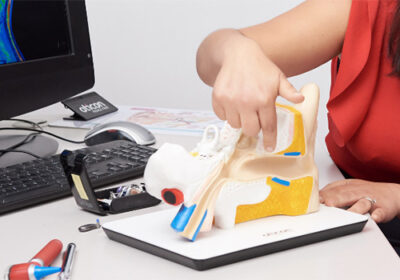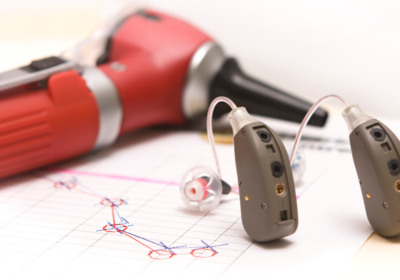What is tinnitus?
Tinnitus is the sensation of hearing a sound when there is no external source for that sound. It is associated with damage to your auditory system.
If you have tinnitus, you’ll hear noises, hisses or hums that are generated by your brain rather than by an external source.
Pulsatile tinnitus can be caused by blood flow problems in your face or neck, muscle movements near your ear, or changes in your ear canal. You may hear your pulse or hear your muscles contracting.
Nonpulsatile tinnitus involves your hearing nerves. People often describe the associated noises as coming from inside their heads.
What are the symptoms of tinnitus?
The tinnitus sound is often described as a ‘ringing in the ears’. Exactly what that feels like varies from one person to another.
Tinnitus symptoms may be:
- Constant or occasional
- Loud or soft
- Mild or severe
- Felt in one ear, both ears or all over the head.
What causes tinnitus?
There are many possible causes but the most common ones are age-related hearing loss or exposure to loud noise.
Tinnitus can happen due to:
Ear-related problems
-
- Any type of hearing loss
- Ear infections
- Ruptured eardrum
- Earwax buildup
- Injury from whiplash or a direct blow to the ear or head.
- Ear injury after surgery or radiation treatment to your head or neck.
Lifestyle factors
- Medicines that affect hearing
- Consuming large amounts of caffeine or alcohol
- Repeatedly hyperextending your neck, such as in regular bike riding
- Severe weight loss
- A rapid change in environmental pressure (barotrauma), which can sometimes happen during scuba-diving or flying.
- Excessive noise exposure
Other health issues
- Conditions affecting your blood flow (vascular system), such as high blood pressure, carotid atherosclerosis or arteriovenous malformations
- Temporomandibular (jaw) disorders
- Neurological (nerve) conditions such as multiple sclerosis or migraines
- Acoustic neuroma
- Anaemia
- Thyroid disease
- Labyrinthitis
- Meniere’s disease
- Otosclerosis.
Depending on its severity, tinnitus may have a greater impact on your life than the underlying condition that’s triggered it.
Are hearing loss and tinnitus related?
In most cases, yes. In fact, up to 80% of people with tinnitus have hearing loss. Tinnitus can result from any type of hearing loss or disorder. While people with good hearing can develop tinnitus, it is much more common in people who have hearing loss, usually caused by ageing or noise exposure.
However, tinnitus can also result from non-hearing issues too, such as a condition affecting your nerves or blood flow.
How can you treat tinnitus?
Tinnitus is not a condition in its own right but rather the result of something else. That means there are two main strands to tinnitus treatment:
- Treat the underlying condition that’s causing the tinnitus
- Alleviate the symptoms of tinnitus.
If your tinnitus is caused by hearing loss, then work with your audiologist to improve your hearing as much as possible.
If your tinnitus is caused by an underlying medical condition, you may need specialist treatment to improve that health issue. You may need to see a cardiologist to improve your blood flow or a neurologist to manage your multiple sclerosis, for example. Improving those conditions may help to relieve your tinnitus symptoms.
It can take time to find the right mix of treatments to ease symptoms of tinnitus. The British Tinnitus Association regularly reviews popular tinnitus treatments to help you avoid wasting time and money on ineffective methods.
You may wish to consider:
- Removing any buildup of earwax
- Changing medications (with your doctor’s advice)
- Using bilateral hearing aids since these may ease tinnitus symptoms
- Psychological support – cognitive behaviour therapy has been shown to reduce depression and improve quality of life among people living with tinnitus
- Practising relaxation techniques to ease stress.
Is tinnitus permanent?
It can be, in some cases, particularly if the underlying cause is hearing loss caused by exposure to loud noises.
Tinnitus has many potential underlying causes, which influence its severity and duration. While it often goes away by itself, you should see an audiologist for diagnosis and management, especially if your tinnitus is lasting weeks and growing louder.
How can Active Audiology help?
We understand how distressing tinnitus can be and we want to help you find relief from it. Our highly trained audiologists can perform a comprehensive hearing assessment to identify whether you have any underlying hearing loss that may be contributing to your tinnitus. Once we establish the severity of your tinnitus we employ different solutions that include masking devices and or counselling therapies.
Book an appointment today.
Disclaimer
All information is general in nature.




